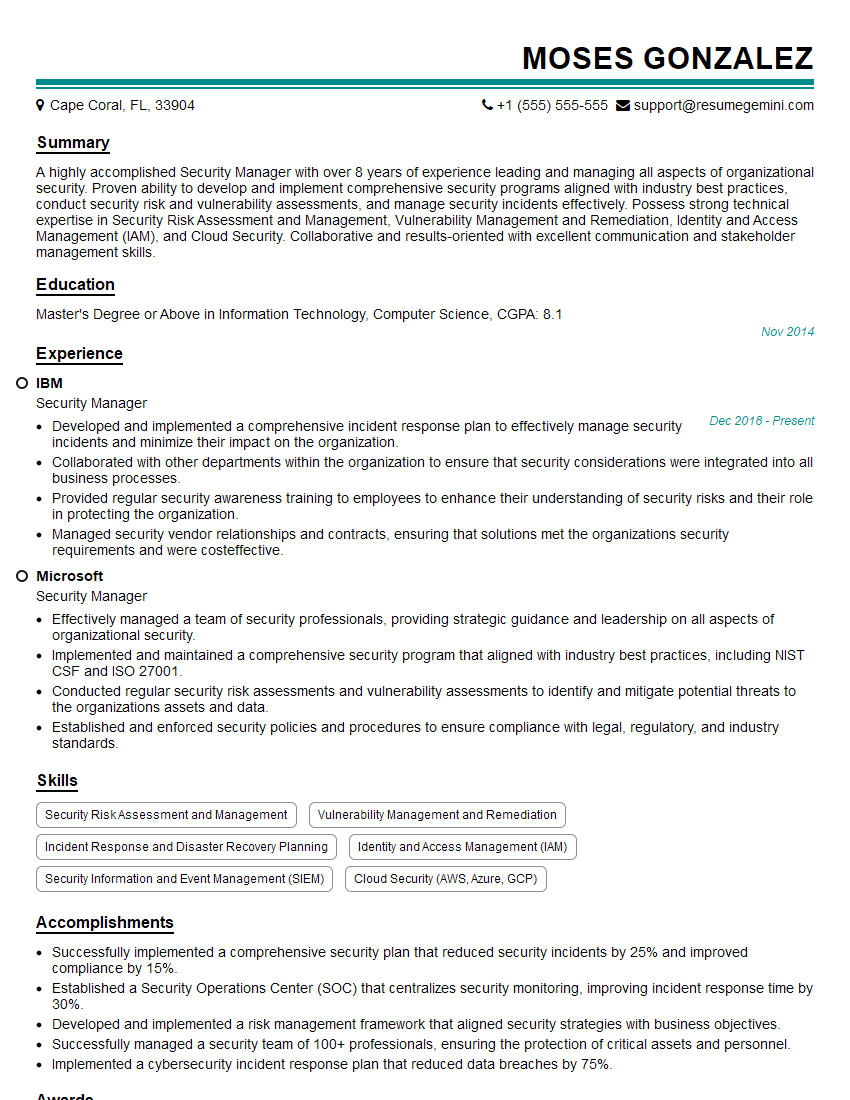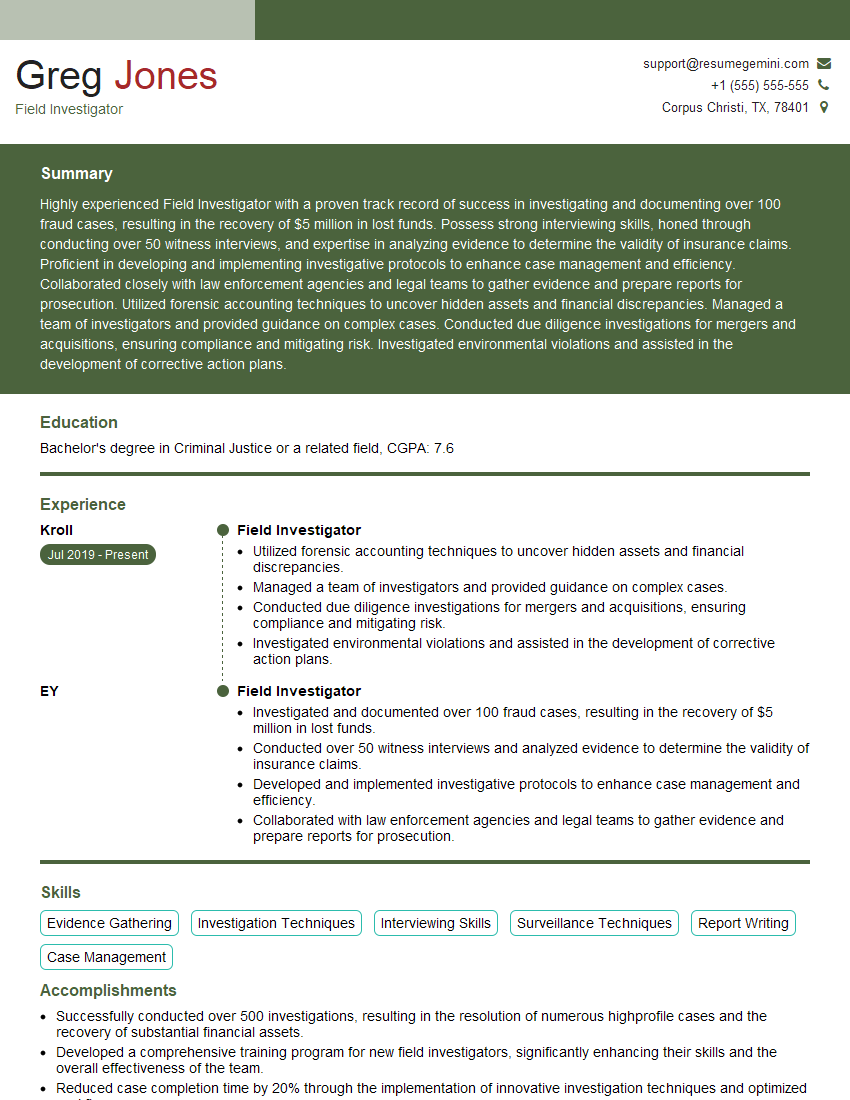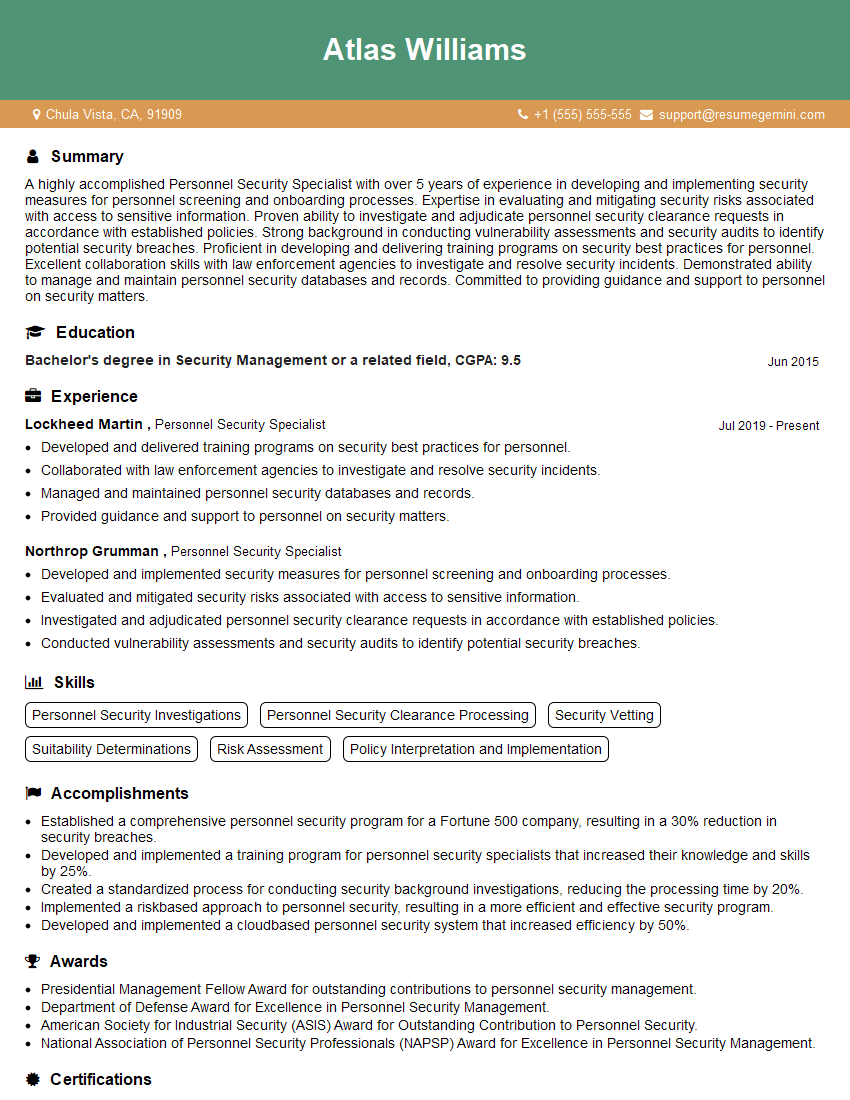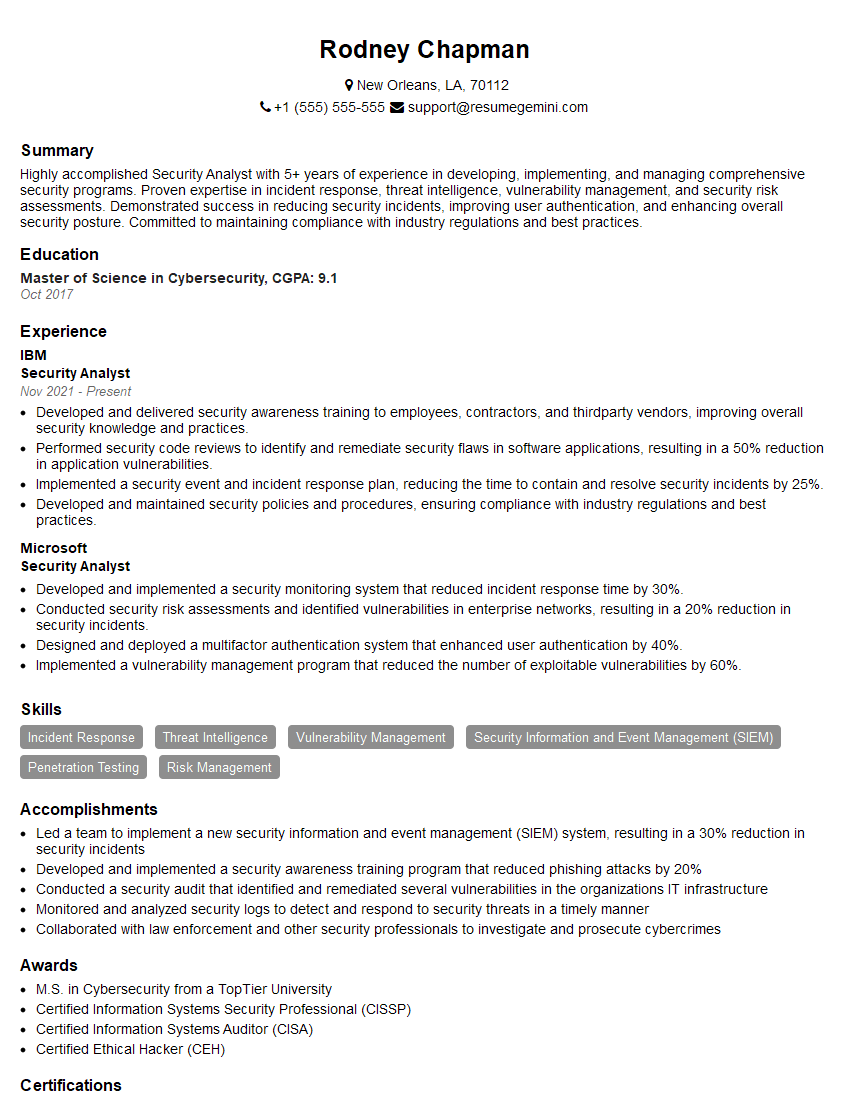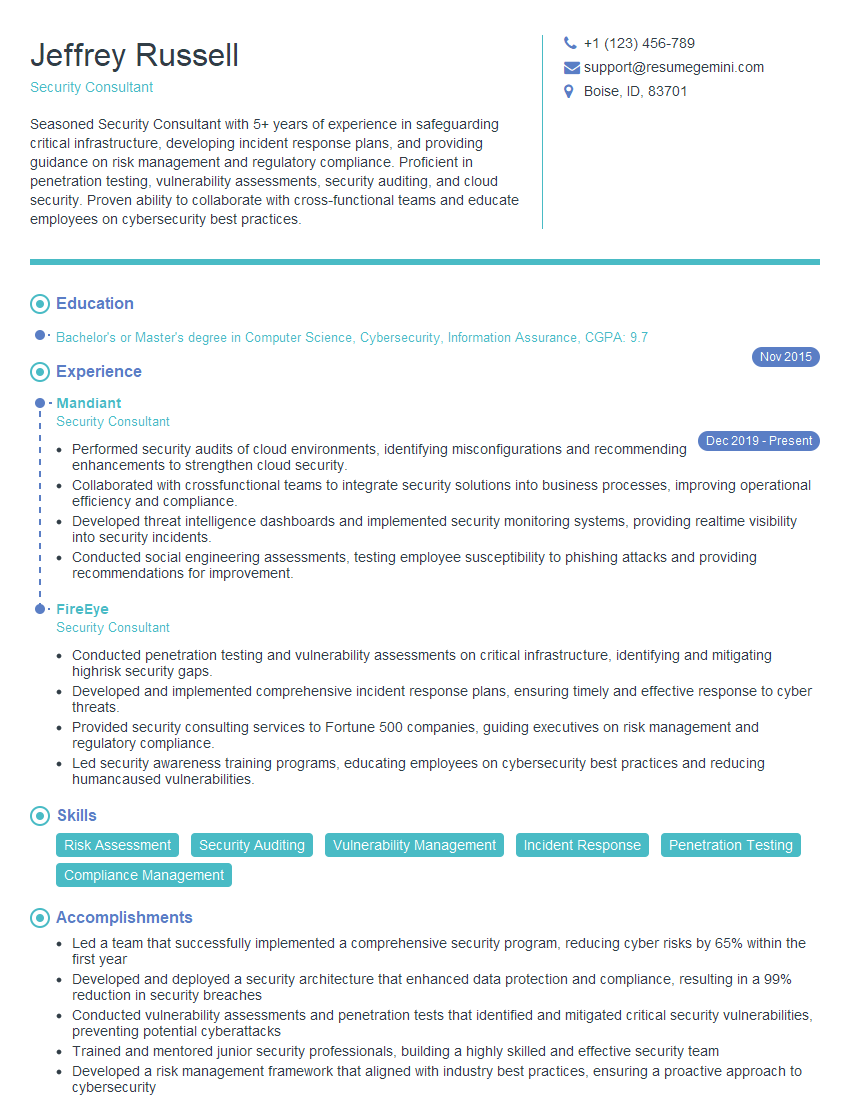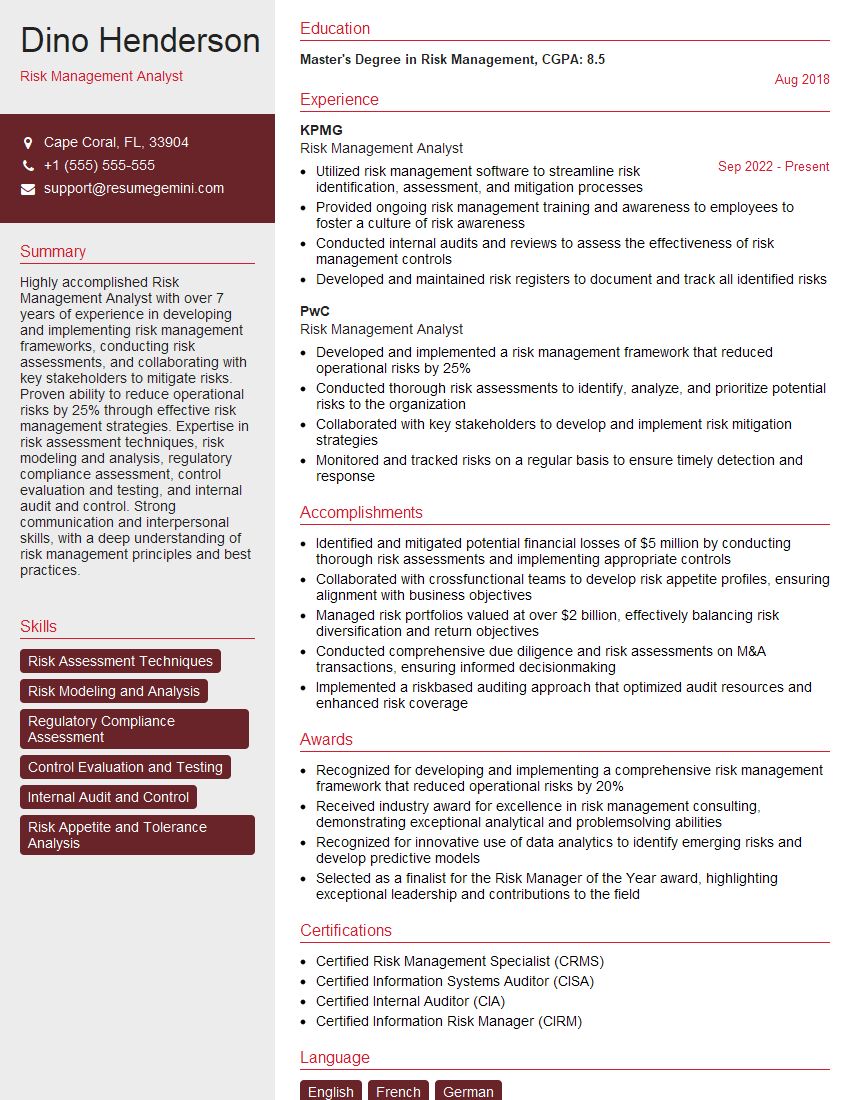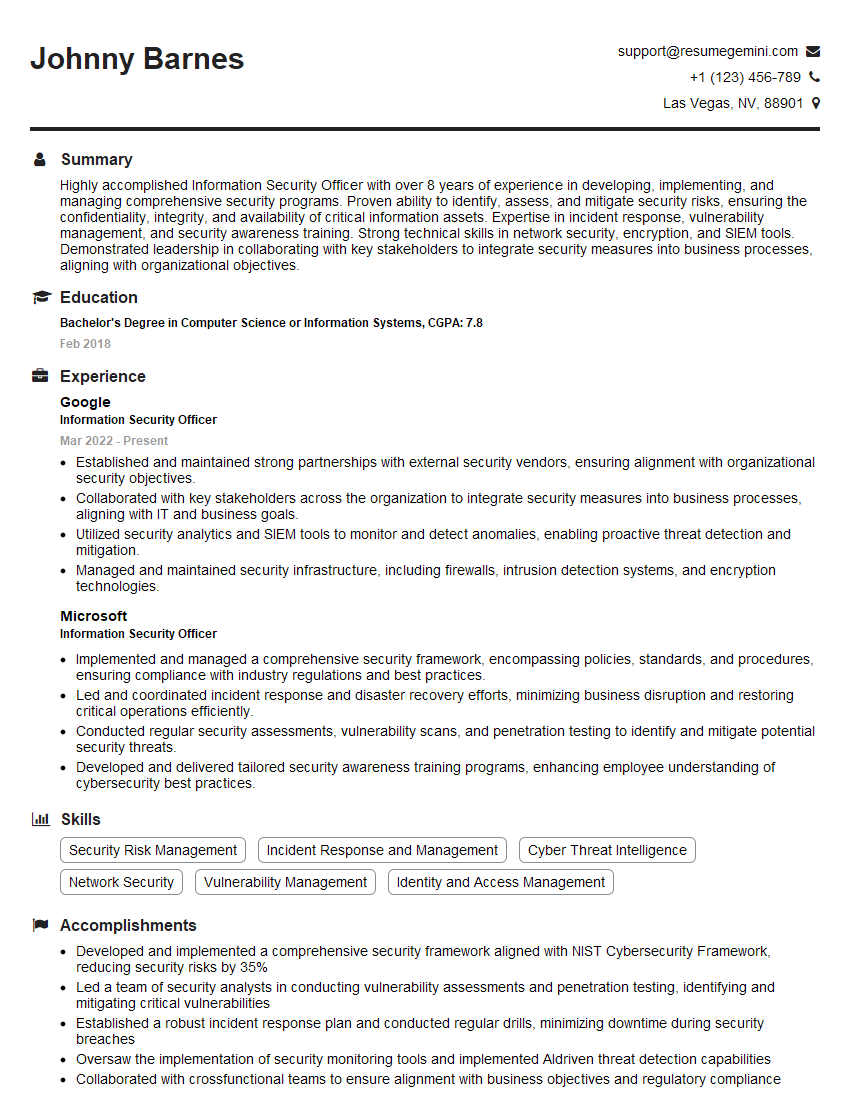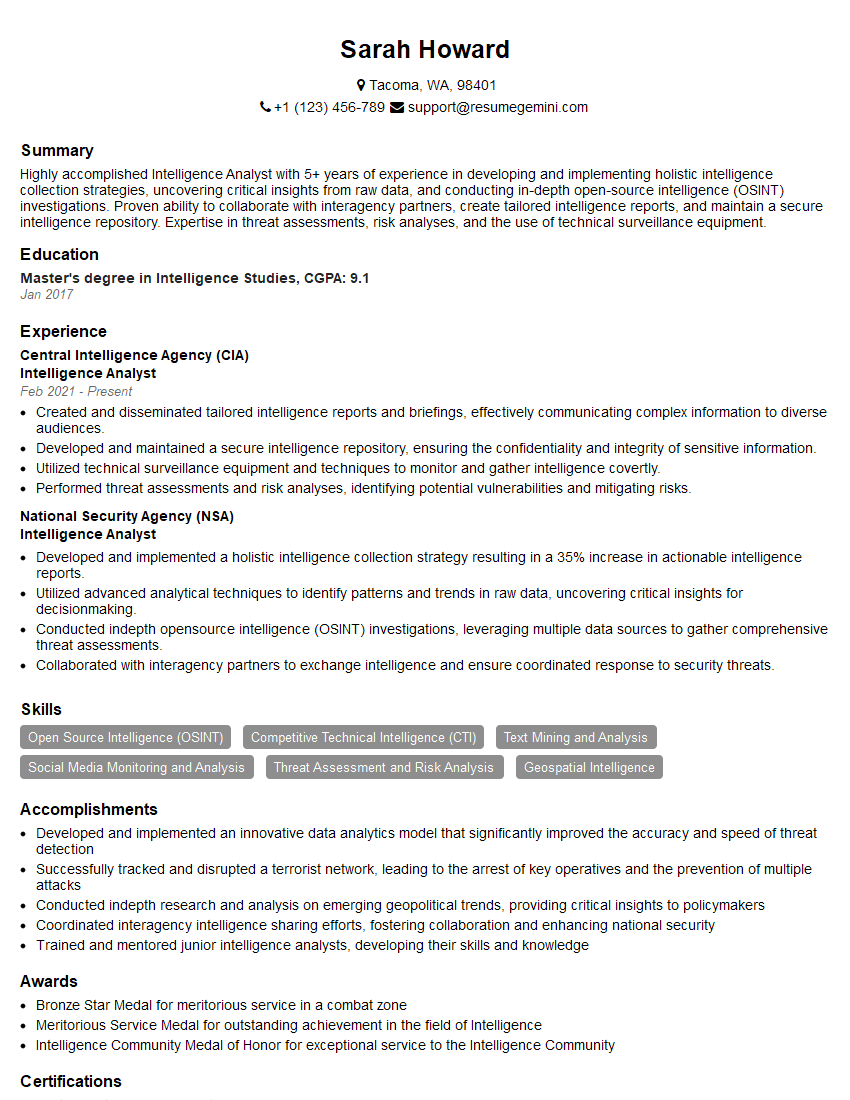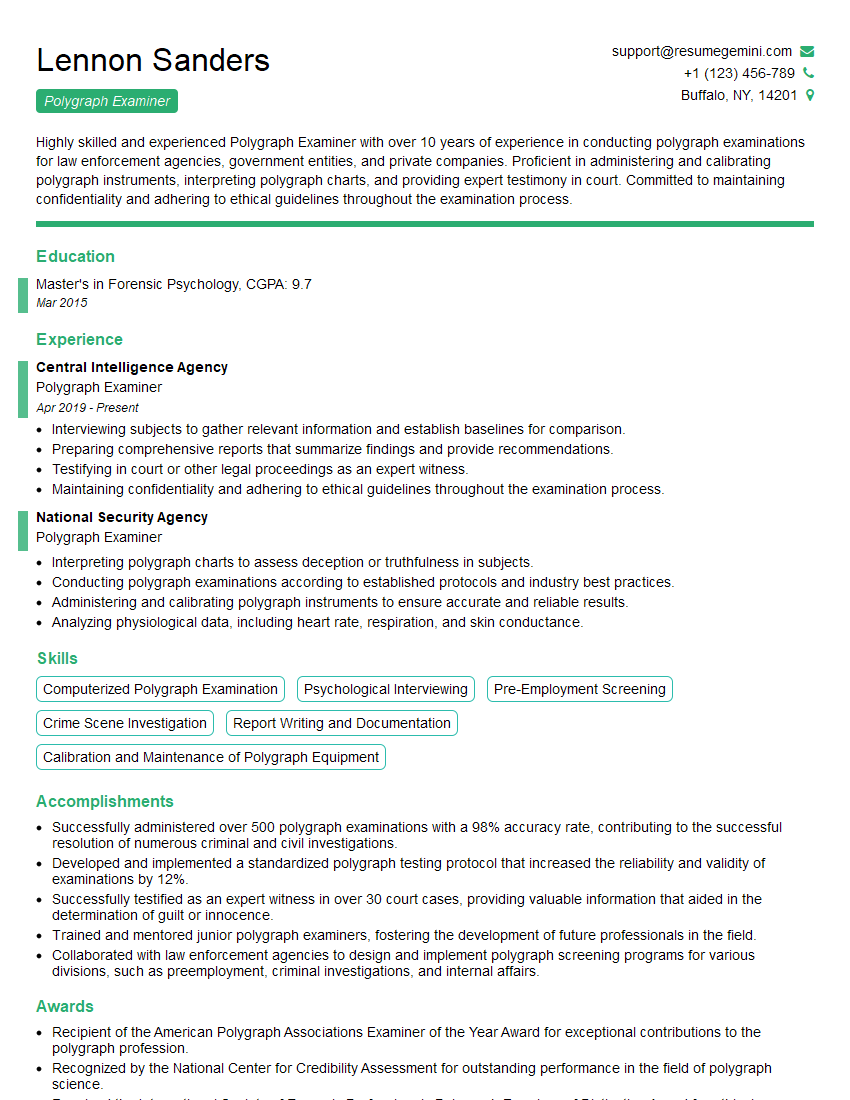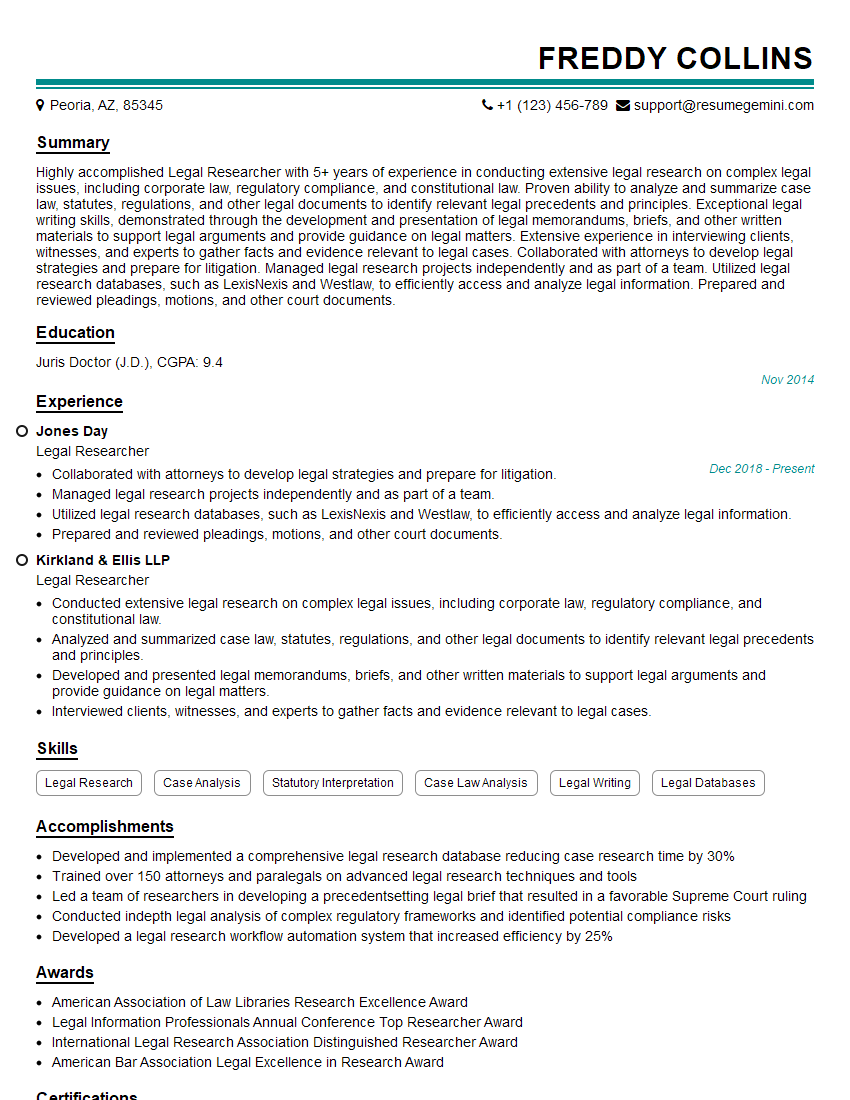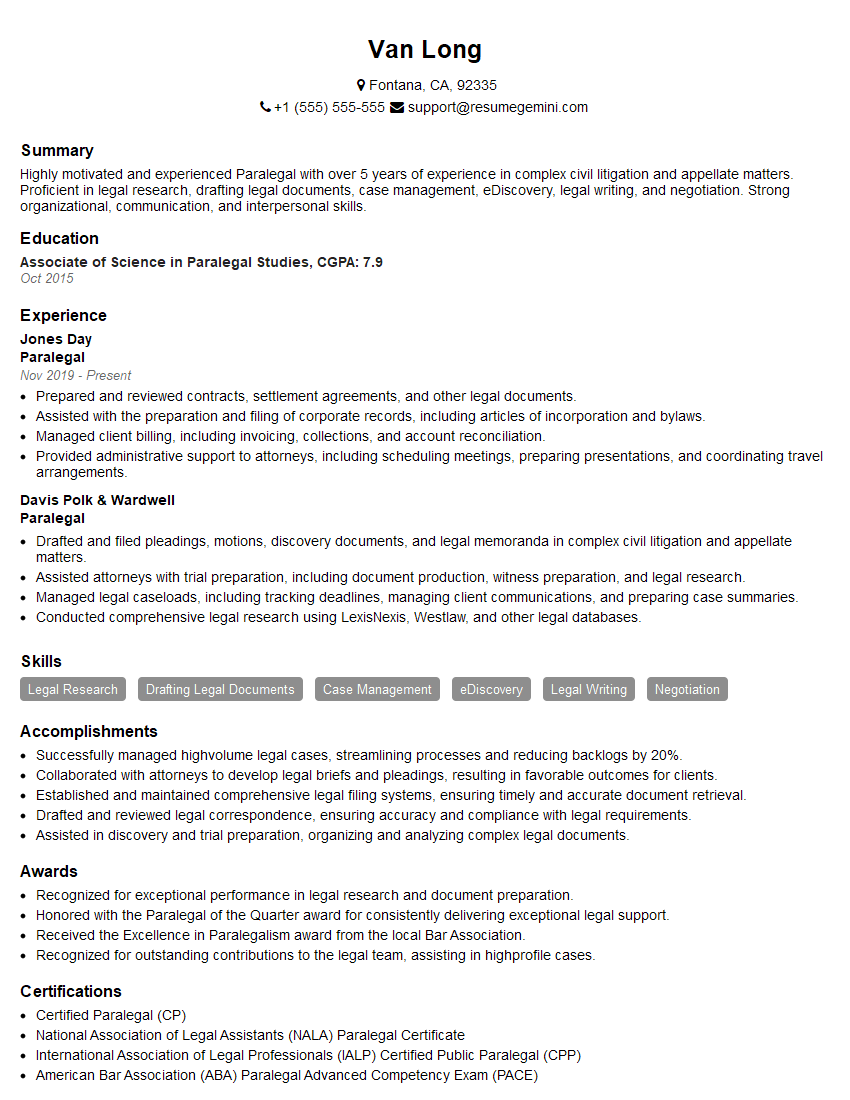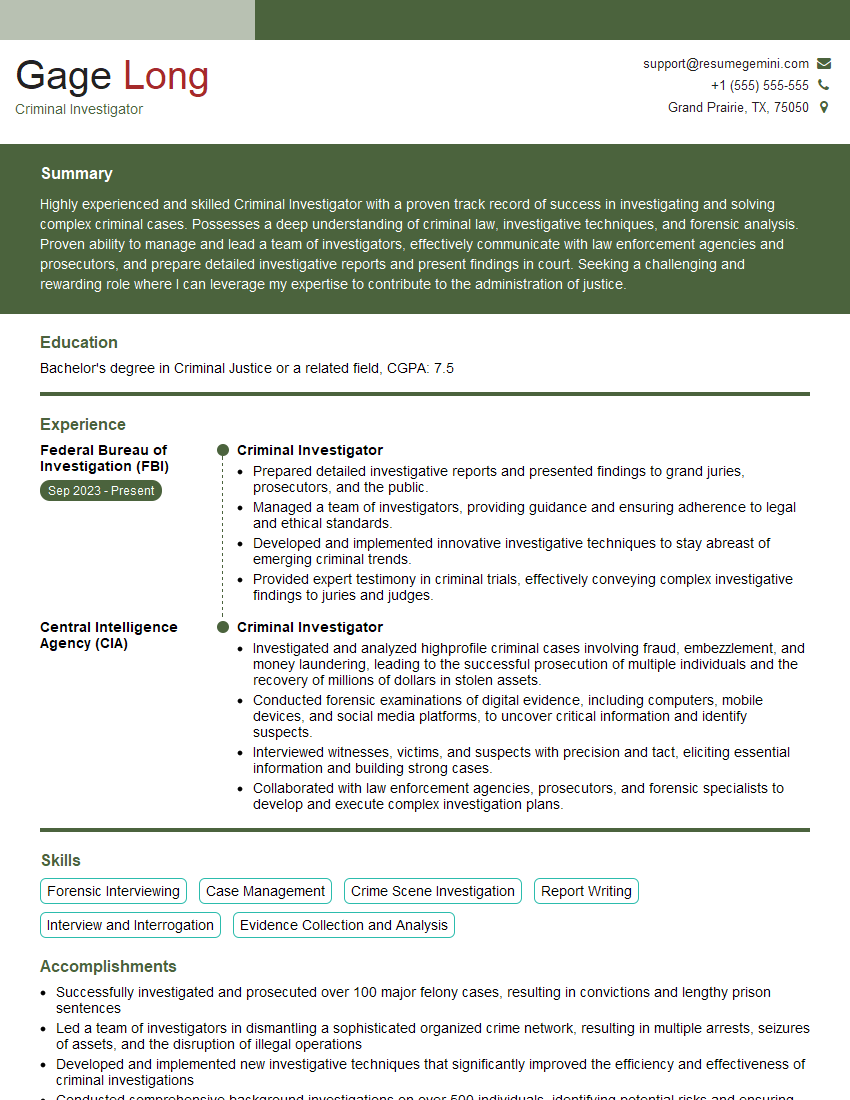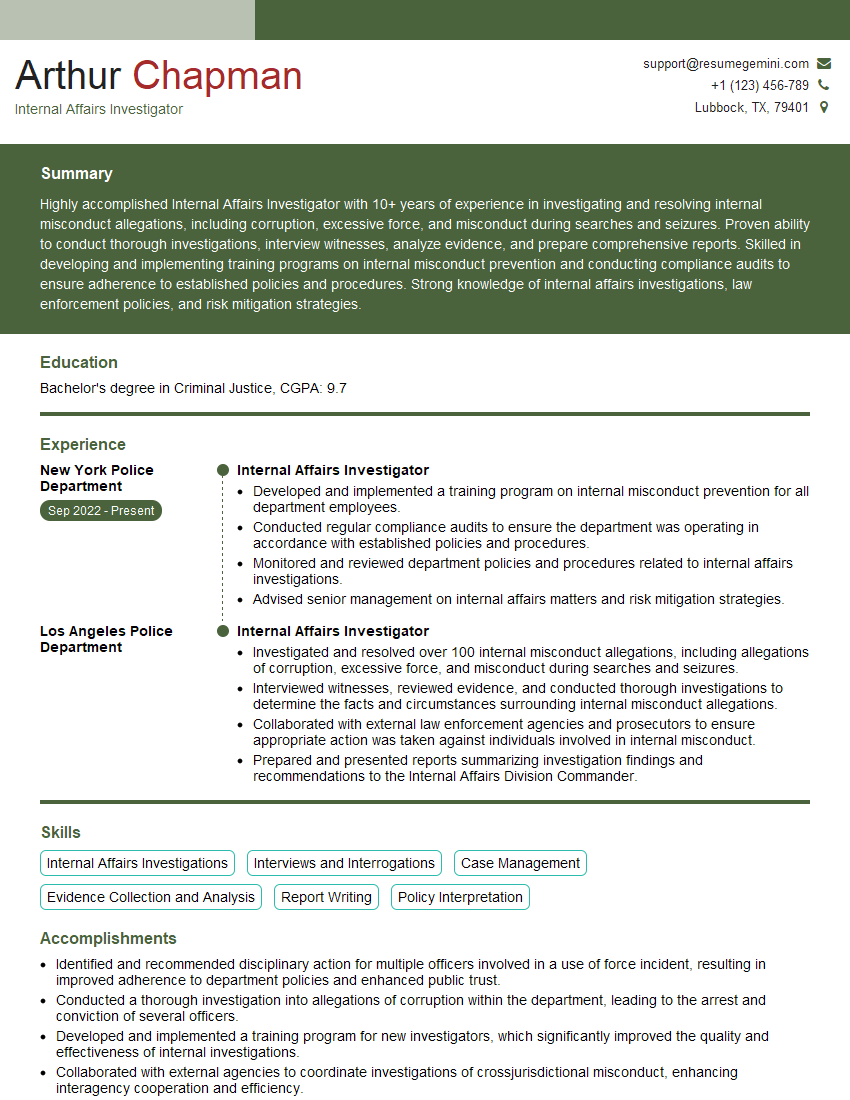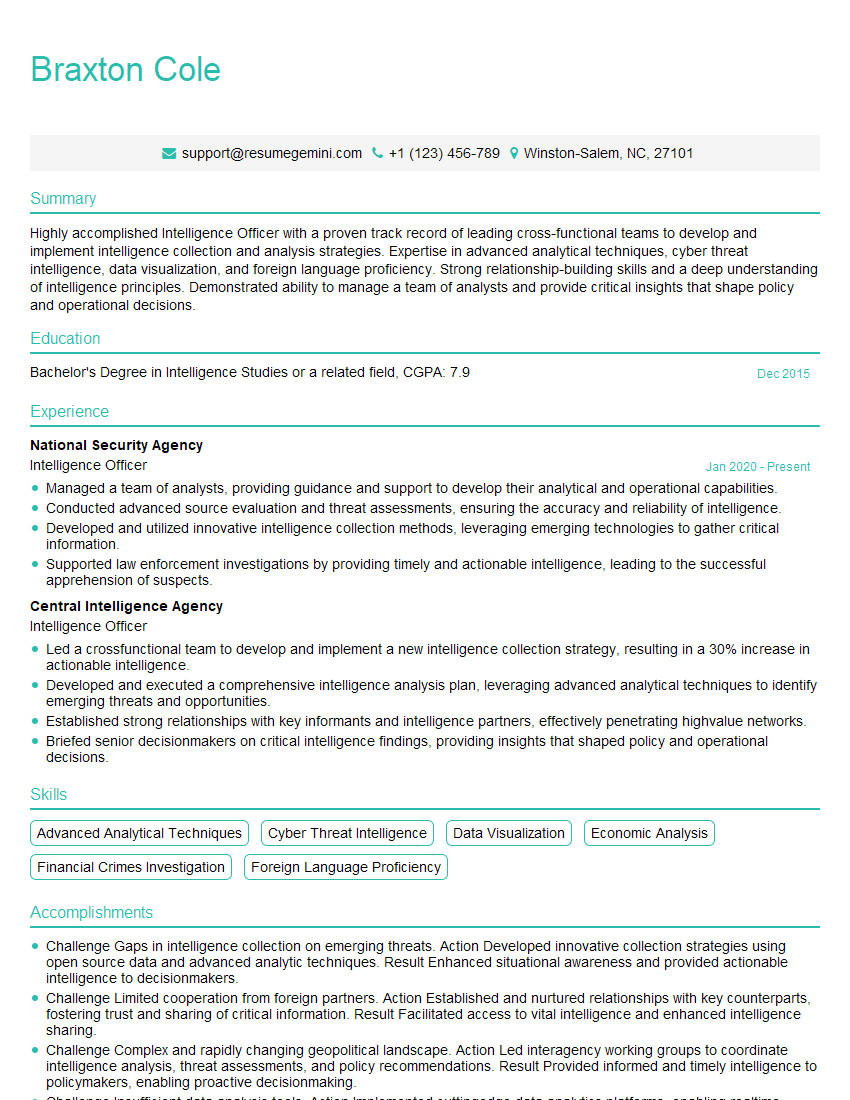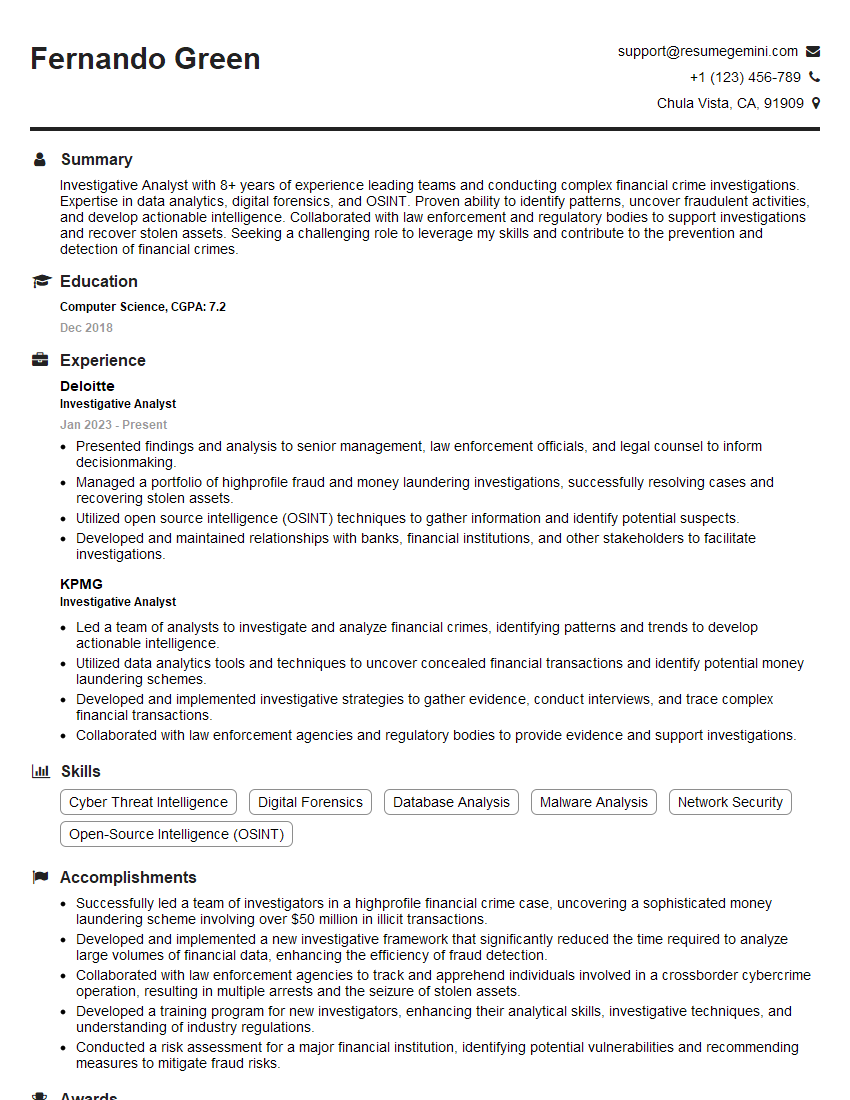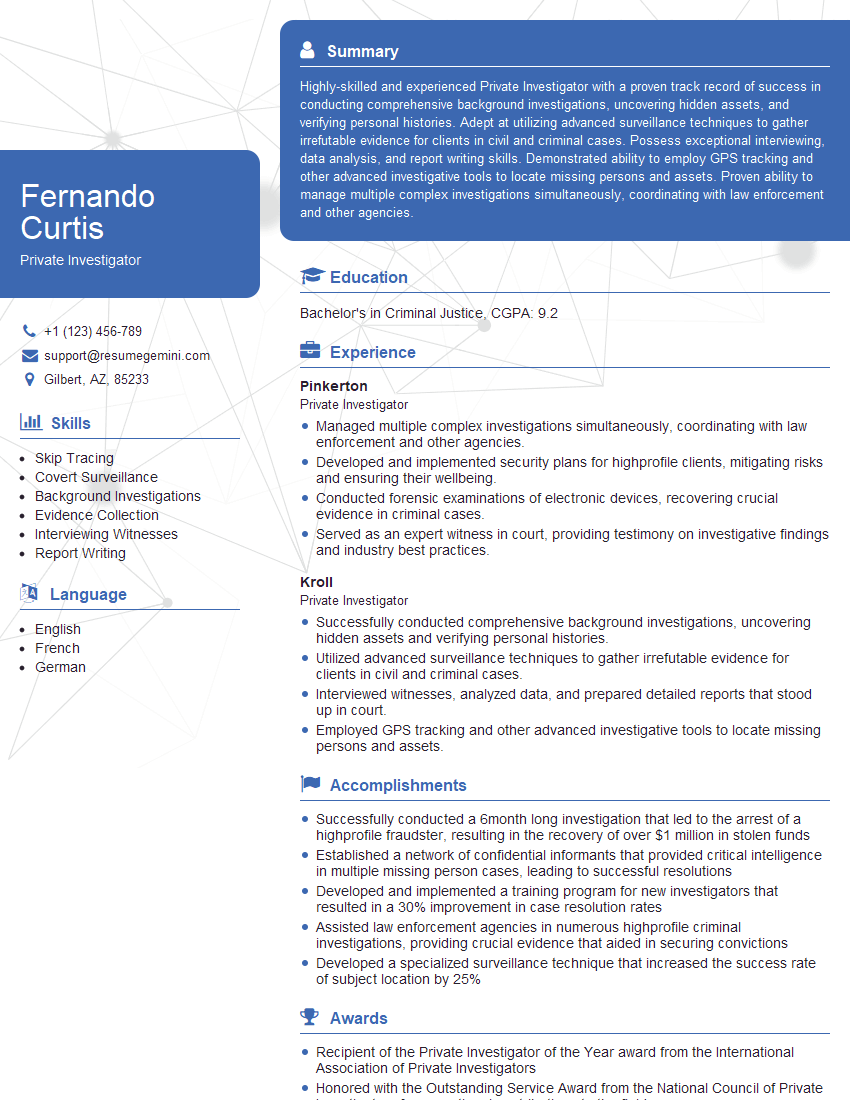Interviews are opportunities to demonstrate your expertise, and this guide is here to help you shine. Explore the essential Law Enforcement Background Checks interview questions that employers frequently ask, paired with strategies for crafting responses that set you apart from the competition.
Questions Asked in Law Enforcement Background Checks Interview
Q 1. Explain the process of conducting a basic background check.
A basic background check typically involves verifying a candidate’s identity and criminal history. It’s like a quick overview, not a deep dive. The process usually starts with obtaining the candidate’s consent to conduct the check. Then, we use reputable databases like those maintained by the FBI and state-level agencies to search for any criminal records, such as felony or misdemeanor convictions, arrests, or pending charges. We also perform a name search to ensure we’re checking the right individual. The results are then compiled into a report summarizing the findings. Think of it as a preliminary screening—it flags potential issues, but further investigation may be needed.
- Identity Verification: This involves checking provided identification such as driver’s license or passport against official databases.
- Criminal History Check: This is a search of federal, state, and sometimes local criminal databases for records of arrests and convictions.
- Report Generation: A concise report is generated summarizing the findings, which may include the existence of any criminal record and its specifics.
Q 2. Describe your experience with different types of background checks (e.g., criminal, employment, education).
My experience spans various background check types. Criminal background checks are the most common, focusing on identifying past criminal activity. Employment background checks verify previous work history, including job titles, dates of employment, and reasons for leaving. Education checks verify the candidate’s educational credentials, such as degrees earned and institutions attended. I’ve also worked with credit checks (where permitted and with proper consent), which assess the candidate’s financial history. Each type requires different databases and verification methods. For example, confirming employment often involves contacting previous employers directly, while verifying education may involve reaching out to universities or colleges.
In one case, I investigated a candidate for a security position. The criminal background check was crucial, requiring a thorough search of national and state-level databases. Another instance involved verifying the employment history of a financial manager; this required meticulously contacting previous employers to verify positions and salary information and verifying the candidate’s professional certifications.
Q 3. How do you verify the accuracy of information obtained during a background check?
Accuracy is paramount. We verify information through multiple sources whenever possible. For example, if a criminal record is found, we don’t just rely on one database. We cross-reference the information with other databases and official court records to ensure accuracy. We also contact previous employers directly to verify employment history rather than solely relying on information provided by the candidate. When discrepancies arise, we investigate further—this could involve contacting additional sources, reviewing official documentation, or conducting further research. Think of it like a detective’s work; we need to piece together all the information to build a complete and accurate picture.
For instance, if a candidate lists a degree from a university, we would not only check the university’s records but also potentially review transcripts and/or contact academic advisors to ensure the degree’s legitimacy and completion date.
Q 4. What are some common challenges you encounter during background investigations?
Common challenges include incomplete or inaccurate information provided by candidates, which can significantly hinder the process. Another is the difficulty in accessing certain records. Some databases have limitations or may not be completely up-to-date. Sometimes records are sealed or expunged, making it difficult to obtain a complete picture. Dealing with multiple jurisdictions and different record-keeping practices across states also adds complexity. Further, ensuring compliance with privacy regulations while conducting thorough checks is a constant balancing act. In addition, managing large volumes of information and keeping up with ever-changing laws and regulations present logistical challenges.
Q 5. How do you handle discrepancies or inconsistencies in information obtained from various sources?
Discrepancies require careful investigation. We document all inconsistencies and try to determine the cause. This may involve contacting the candidate to clarify the issue, reaching out to additional sources to corroborate information, or reviewing any supporting documentation they may provide. In some cases, inconsistencies may be explained by simple errors. In others, they may point to more significant concerns. Our goal is to reconcile discrepancies and provide a clear and accurate picture, even if that means acknowledging limitations in what information we can definitively confirm.
For example, a discrepancy in employment dates may be due to a simple typo, a misremembering by the candidate, or something more serious. Our investigation aims to determine which of these possibilities is most likely.
Q 6. Explain your understanding of different state and federal laws related to background checks.
My understanding of state and federal laws related to background checks is extensive. The Fair Credit Reporting Act (FCRA) is a key federal law governing the use of consumer reports, including those used in background checks. It dictates how information is collected, used, and disclosed, and outlines the rights of individuals subject to background checks. State laws also vary significantly, impacting what information can be collected, the types of checks permissible, and the permissible timeframe for considering past offenses. For example, some states have specific laws about expungement or sealing of records, which impacts what information is accessible during a background check. Staying current on these ever-changing regulations is a crucial part of my job.
Q 7. How do you maintain confidentiality and comply with privacy regulations throughout the background check process?
Confidentiality and privacy are paramount. We adhere strictly to all applicable laws and regulations, including the FCRA and state-specific privacy laws. We only collect information necessary for the specific purpose of the background check and use appropriate security measures to protect sensitive data. Access to background check information is restricted to authorized personnel only. We use secure data storage and transmission methods, regularly update security protocols, and follow strict procedures for data handling and disposal. The candidate’s right to privacy is always respected, and transparency is maintained throughout the process.
For example, we employ encryption during data transmission and storage to protect information from unauthorized access. Access to the database itself is protected by strong passwords and user authentication.
Q 8. Describe your experience with using background check databases and resources.
My experience with background check databases and resources is extensive. I’ve worked with a wide variety of commercial databases like LexisNexis, Accurint, and others, as well as government resources such as state and federal criminal record repositories. I am proficient in navigating these systems, understanding their limitations, and interpreting the information they provide. For example, I’ve used LexisNexis to uncover inconsistencies in a candidate’s employment history, and I’ve utilized state criminal databases to verify the existence and details of prior arrests and convictions. My expertise extends beyond simply searching; I understand the nuances of different data sources and how to correlate information from multiple sources to build a comprehensive picture. This includes understanding the potential for incomplete or inaccurate data and employing strategies to verify information from multiple independent sources.
I’m also familiar with the legal and ethical considerations associated with accessing and using this information, ensuring compliance with all applicable laws and regulations like the Fair Credit Reporting Act (FCRA). This involves meticulous record-keeping and adherence to strict confidentiality protocols.
Q 9. What is your process for reporting your findings from a background investigation?
My process for reporting findings from a background investigation is structured and thorough. I begin by creating a detailed written report that summarizes all information gathered, including sources, dates, and specific details. I organize the report chronologically or thematically, depending on the investigation’s specifics. This report is comprehensive and includes all relevant information, positive and negative. I don’t just highlight potential red flags; I also note any mitigating circumstances or positive aspects revealed during the investigation.
For example, a candidate may have a past misdemeanor, but my report might also include evidence of rehabilitation, community involvement, or letters of support. I carefully document the methods used to verify information, including interviews conducted, documents reviewed, and databases accessed. Finally, I present my findings objectively, avoiding personal opinions or biases, and offer a clear and concise summary of the candidate’s suitability based on the collected data. All reports are reviewed for accuracy and completeness before dissemination to the appropriate parties.
Q 10. How do you prioritize information gathered during a background investigation?
Prioritizing information in a background investigation requires careful judgment and understanding of the context. I prioritize information based on its relevance to the specific position and the organization’s needs. For instance, a felony conviction for embezzlement would be more concerning for a financial position than a minor traffic violation. Similarly, a history of violence would be a significant concern for a security-related role.
My prioritization process involves a multi-step approach: First, I identify all relevant information. Then, I assess the severity and recency of each item. Finally, I consider mitigating factors, such as evidence of rehabilitation or extenuating circumstances. I use a weighted scoring system, where serious infractions carry more weight than minor ones, to rank the information in order of importance. This allows me to present the most critical information first in my report.
Q 11. How do you assess the relevance and significance of information obtained in a background investigation?
Assessing the relevance and significance of information obtained during a background investigation requires critical thinking and experience. I consider several factors: the nature of the information (e.g., criminal record, employment history, credit report), its recency, its severity, and its relevance to the specific job or role. For example, a 20-year-old misdemeanor for shoplifting might be less relevant than a recent DUI for a delivery driver position.
I use a structured approach to evaluate this information, weighing the potential risk associated with each piece of data against its relevance. I always cross-reference information from multiple sources to avoid relying on any single piece of data. I also consider the context in which the information was obtained, understanding that circumstances can significantly impact interpretation. For example, a past bankruptcy might be attributed to unforeseen circumstances and not reflective of overall financial responsibility. Ultimately, my assessment aims to provide a balanced and objective view, avoiding overgeneralizations and premature conclusions.
Q 12. Explain your experience with conducting interviews as part of a background check.
Conducting interviews is a crucial aspect of my background investigations. I approach interviews professionally and ethically, ensuring the interviewee understands the purpose of the interview and their rights. I prepare a structured set of questions beforehand, tailoring them to the specific individual and the position they are applying for. However, I also allow for flexibility to explore unexpected or relevant information that arises during the conversation.
For instance, I might ask about gaps in employment history, or delve deeper into specific situations mentioned in resumes or applications. My goal isn’t to trap or intimidate; it’s to gain a deeper understanding of the candidate’s character, work ethic, and overall suitability. I actively listen, take detailed notes, and confirm information provided with other sources. I always treat interviewees with respect and maintain a professional demeanor, regardless of the information revealed.
Q 13. How do you handle sensitive information such as criminal records or financial issues?
Handling sensitive information, such as criminal records or financial issues, is paramount to my work. I adhere strictly to all applicable privacy laws and regulations, including the FCRA. This means I only access and use information that is relevant and legally permissible. I never share sensitive information with unauthorized individuals or entities. My record-keeping practices are meticulous, with all accessed information and findings carefully documented and secured.
I use secure databases and systems, and I always follow appropriate data destruction protocols when information is no longer needed. I understand the potential impact of such information on an individual’s life and therefore treat it with the utmost care and respect. My objective is to ensure fairness and accuracy while upholding the highest standards of ethical conduct. In cases involving particularly sensitive information, I consult with legal counsel to ensure full compliance.
Q 14. Describe your experience with using different investigative techniques and methodologies.
My experience with investigative techniques and methodologies is diverse. I’m proficient in various methods, including online searches, record reviews (both public and private), interviews, and open-source intelligence gathering. I’m adept at using social media analysis responsibly and ethically to cross-reference information and gain a better understanding of a candidate.
For example, I might verify employment history by contacting previous employers directly or cross-referencing information found online. I am skilled in verifying education credentials, licenses, and certifications. I understand the limitations of each method and adapt my approach depending on the specific investigation and the information required. I also remain updated on the latest investigative techniques and technologies, ensuring I employ the most effective and reliable methods. My approach is always systematic and thorough, ensuring that every lead is pursued, and every piece of information is carefully verified and corroborated.
Q 15. How do you ensure the integrity and reliability of information gathered during a background check?
Ensuring the integrity and reliability of information gathered during a background check is paramount. It’s like building a house – you need a strong foundation. We achieve this through a multi-pronged approach:
- Source Verification: We don’t just accept information at face value. Every piece of data, from employment history to criminal records, is verified with original sources. For instance, we contact previous employers directly instead of relying solely on a resume. This eliminates potential inaccuracies or falsifications.
- Multiple Data Points: We utilize multiple databases and resources to cross-reference information. Finding consistent information across several sources significantly increases confidence in its accuracy. Think of it like triangulation in navigation – the more data points, the more precise the location (or in this case, the accuracy of the information).
- Chain of Custody: We meticulously document the source and handling of all information, maintaining a clear audit trail. This is crucial for transparency and accountability, and vital should the investigation ever be challenged legally. It’s like tracking a package – you can see its journey from origin to destination, ensuring no tampering occurred.
- Data Security: Protecting the privacy and security of the information we handle is paramount. We adhere to strict data protection protocols, utilizing encrypted systems and secure data storage to prevent unauthorized access or breaches. This is critical to maintain both legal compliance and ethical standards.
By combining these methods, we build a robust and reliable picture of the individual, minimizing the risk of error and ensuring the integrity of the entire process.
Career Expert Tips:
- Ace those interviews! Prepare effectively by reviewing the Top 50 Most Common Interview Questions on ResumeGemini.
- Navigate your job search with confidence! Explore a wide range of Career Tips on ResumeGemini. Learn about common challenges and recommendations to overcome them.
- Craft the perfect resume! Master the Art of Resume Writing with ResumeGemini’s guide. Showcase your unique qualifications and achievements effectively.
- Don’t miss out on holiday savings! Build your dream resume with ResumeGemini’s ATS optimized templates.
Q 16. What is your experience with conducting background checks on individuals with diverse backgrounds?
My experience encompasses conducting background checks on individuals from diverse backgrounds, including those with prior criminal records, immigration histories, or complex employment trajectories. I understand that a person’s past doesn’t define their future. My approach is to analyze information within context, considering mitigating factors and ensuring a fair and objective assessment.
For example, I recently conducted a background check for a candidate with a past misdemeanor conviction. Instead of simply rejecting the candidate, I investigated the circumstances surrounding the conviction, the individual’s rehabilitation efforts since then (like community service or educational achievements), and their subsequent clean record. This nuanced approach provided a more complete and fair understanding of the candidate.
This requires sensitivity and an understanding of potential biases, ensuring a fair assessment regardless of race, ethnicity, religion, or any other protected characteristic. The goal isn’t just to compile data, but to use that data to inform a balanced and impartial evaluation.
Q 17. How do you deal with individuals who are uncooperative or resist providing information?
Dealing with uncooperative individuals requires patience, persistence, and a firm understanding of legal limitations. My strategy is multifaceted:
- Multiple Contact Attempts: We employ multiple methods to reach individuals – phone calls, emails, certified mail – and make repeated attempts to obtain their cooperation.
- Legal Avenues: If necessary, we explore legal avenues such as subpoenas to compel the release of information. This step is only taken after exhausting all other options and is always pursued within the confines of the law.
- Documentation: Every attempt to contact the individual, along with their response (or lack thereof), is meticulously documented. This is vital for demonstrating due diligence and for potential legal proceedings.
- Alternative Sources: If an individual is uncooperative, we explore alternative sources of information to gather as much relevant data as possible. This might involve reaching out to previous employers, references, or other individuals who could provide insights.
The key is to balance persistence with respect for individual rights. The goal is to obtain the information needed for a complete and fair assessment while adhering to ethical and legal standards.
Q 18. Describe your experience using technology and software in background checks.
Technology and software are integral to modern background checks. I’m proficient in using a variety of database systems, including those providing access to criminal records, employment verification, and credit reports.
For example, I regularly utilize software that allows for automated data collection from multiple sources, streamlining the process and significantly reducing processing time. Example software name: LexisNexis Accurint (This is just an example, many other platforms exist). This software integrates with other systems, allowing for seamless data transfer and reducing the risk of manual errors. It also offers advanced search capabilities, enabling us to identify potential matches even with incomplete or misspelled information.
Moreover, I’m adept at utilizing data analytics tools to identify patterns and inconsistencies in the data, flagging potential areas requiring further investigation. This capability is invaluable in complex investigations where a vast amount of information needs to be processed and interpreted accurately.
Q 19. Explain your understanding of the Fair Credit Reporting Act (FCRA).
The Fair Credit Reporting Act (FCRA) is a crucial piece of legislation that governs the collection, use, and dissemination of consumer credit information. It’s designed to protect individuals from inaccurate or unfairly obtained information affecting their creditworthiness, employment prospects, or other important life aspects.
My understanding of the FCRA extends to several key areas:
- Consumer Rights: I’m aware of the rights consumers have regarding access to their credit reports, the right to dispute inaccurate information, and the procedures for handling disputes.
- Disclosure Requirements: I understand the importance of properly disclosing to individuals that a background check is being conducted and providing them with their rights under the FCRA.
- Adverse Action Notice: I am familiar with the requirements for providing an adverse action notice when a hiring decision is negatively impacted by information contained in a background check.
- Data Security and Privacy: I am fully aware of the responsibilities of maintaining secure and confidential handling of consumer data.
Compliance with the FCRA is not just a legal requirement; it’s an ethical imperative. Violating the FCRA can have serious legal consequences for both the individual conducting the check and the organization they represent.
Q 20. How do you determine the admissibility of evidence in a background investigation?
Determining the admissibility of evidence in a background investigation hinges on several factors, primarily its relevance, reliability, and legality. It’s a critical aspect, as inadmissible evidence can invalidate the entire investigation.
- Relevance: The evidence must be relevant to the purpose of the background check. For example, a past speeding ticket might not be relevant for a security clearance, but a felony conviction might be.
- Reliability: The evidence must be trustworthy and from a credible source. Hearsay, for example, is generally inadmissible unless it falls under a specific exception. We only consider evidence obtained through reliable channels and verified by original sources.
- Legality: The evidence must be obtained legally. For instance, evidence obtained through illegal searches or seizures is inadmissible. This requires a thorough understanding of privacy laws and constitutional rights.
- Timeliness: The relevance of information often diminishes over time. Old convictions may be less relevant depending on the position and the time elapsed since the event.
Often, legal counsel is consulted to ensure all evidence considered is admissible and compliant with relevant laws and regulations. Think of it like a judge in a court deciding what evidence is allowed to be presented – only the most credible and lawfully obtained information is considered.
Q 21. How do you manage large volumes of information during a complex background check?
Managing large volumes of information in complex background checks requires a systematic and organized approach. It’s like organizing a large library – you need a good cataloging system.
- Data Organization: We utilize case management software to organize and categorize the vast amount of information gathered. This allows for efficient retrieval and analysis of specific data points.
- Data Analysis Tools: Sophisticated data analysis tools help identify trends, inconsistencies, and potential red flags within the data. This speeds up the process and flags areas that require further investigation.
- Team Collaboration: In complex cases, collaboration within a team is essential. Assigning specific tasks and responsibilities ensures that all aspects of the investigation are addressed efficiently. This is similar to a team of doctors working on a complex case – each expert addresses their specialized area.
- Prioritization: Prioritizing information based on relevance and urgency is critical. Focusing on the most critical aspects first ensures a timely and efficient completion of the investigation.
Ultimately, a structured methodology and the use of appropriate tools are crucial for efficiently handling the complexities of large-scale background checks, leading to a complete and timely assessment.
Q 22. Explain your experience with different types of record-keeping systems used in background investigations.
My experience encompasses a wide range of record-keeping systems used in background investigations. This includes both proprietary databases used by private investigation firms and public access systems like those maintained by state and federal agencies. For example, I’ve extensively used state-level criminal history databases, which often require navigating complex interfaces and understanding specific query parameters to effectively retrieve relevant data. I’m also proficient with national databases like the FBI’s National Crime Information Center (NCIC) and commercial background check platforms that aggregate data from multiple sources. Each system presents unique challenges in terms of data format, search capabilities, and data accuracy, requiring a tailored approach for optimal results. Furthermore, I’m adept at managing and maintaining physical files, including personnel files, when necessary, ensuring their secure storage and proper organization for easy retrieval. The key is adapting to the specific nuances of each system while maintaining consistent accuracy and data integrity.
For instance, one system might require specific date formats or Boolean search operators, while another might rely on identifying codes or subject aliases. Mastering these variations allows for more efficient and complete data retrieval.
Q 23. How do you balance efficiency and thoroughness in conducting background checks?
Balancing efficiency and thoroughness in background checks is a crucial aspect of the process. It’s akin to finding the sweet spot between speed and accuracy in any investigative work. Rushing the process can lead to oversight, potentially compromising the reliability of the investigation, while being overly meticulous can lead to unnecessary delays. My approach involves establishing a structured process with clear timelines and checkpoints. I prioritize critical information first, focusing on areas like criminal history, employment verification, and education verification. This targeted approach minimizes wasted time on less crucial details. Furthermore, I utilize advanced search techniques and data analysis tools to expedite the process without compromising accuracy. I also cross-reference information from multiple sources to verify the accuracy of the findings and to identify any potential inconsistencies.
For example, I might use automated tools to verify employment history, but I’d follow up with phone calls to confirm critical details. This dual approach ensures efficiency while also mitigating the risk of relying on potentially inaccurate automated data.
Q 24. How do you stay current on the evolving legal landscape of background checks?
Staying current with the ever-evolving legal landscape of background checks requires continuous learning and proactive engagement. I regularly monitor changes in federal and state laws related to background check procedures, data privacy, and permissible inquiries. This includes reviewing updates to the Fair Credit Reporting Act (FCRA), the Privacy Act, and various state-specific regulations. I achieve this through subscribing to legal updates, attending professional development workshops, and participating in online forums and professional organizations focused on background investigations. I also consult with legal counsel when faced with ambiguous or complex legal situations to ensure compliance.
For example, changes in data privacy laws might require adjustments to how we collect and store personal information, which I must immediately adopt to ensure the legal compliance of the investigations conducted.
Q 25. Describe a situation where you had to make a difficult decision regarding information obtained during a background check.
In one case, I discovered a past criminal conviction for a candidate applying for a position requiring significant public trust. The conviction was for a relatively minor offense from many years prior, and the candidate had subsequently led an exemplary life. The difficult decision was whether to flag this information, which could potentially disqualify a seemingly qualified individual, or to weigh it against their demonstrated rehabilitation and subsequent positive contributions. I addressed this by presenting all the gathered data – the conviction details, evidence of rehabilitation, and the requirements of the position – to my supervisor and legal counsel. After careful deliberation, we decided to fully disclose the information to the hiring manager but also provide context regarding the candidate’s significant positive contributions since the incident. Ultimately, the decision rested with the hiring manager, but we ensured that they had all the relevant information to make a fully informed decision.
Q 26. How do you deal with potential biases during the background investigation process?
Addressing potential biases is critical in conducting impartial background investigations. I actively work to mitigate biases by focusing on objective facts and verifiable information. This means relying on documented evidence rather than assumptions or personal opinions. I use standardized procedures and checklists to minimize subjective interpretations. I also consciously challenge my own assumptions and regularly review my processes to identify and correct for potential biases. This includes seeking a second opinion from a colleague on potentially ambiguous findings to ensure objectivity. Furthermore, I receive regular training on implicit bias and diversity, equity, and inclusion, to ensure I’m better equipped to conduct fair and objective investigations.
For instance, if I were to find conflicting information about an applicant’s past, I would take extra steps to validate each piece of information using multiple sources and methods, thereby reducing reliance on potentially biased single sources of information.
Q 27. What is your experience with conducting background checks on applicants for positions with security clearances?
I have significant experience conducting background checks for applicants seeking security clearances. This involves a far more rigorous process than typical background checks, requiring comprehensive reviews of an applicant’s background, including financial records, employment history, education verification, criminal history, foreign contacts, and psychological evaluations. I am deeply familiar with the specific requirements and standards set by the relevant security clearance agencies, such as the Department of Defense or the Office of Personnel Management. This includes navigating intricate security protocols and handling sensitive information with the utmost care and discretion. The process often requires meticulous documentation, adherence to strict timelines, and the ability to synthesize large amounts of data from diverse sources to accurately assess an applicant’s suitability.
Q 28. Describe your understanding of the implications of false information in background checks.
The implications of false information in background checks are severe and can have far-reaching consequences. False information can lead to inaccurate assessments of an individual, which can result in wrongful employment decisions, security clearance denials, or even legal ramifications. Providing false information is often a violation of the FCRA and other related regulations, leading to potential legal actions against both the individual providing the false information and the organization using the inaccurate information. The consequences can be particularly critical when the false information relates to criminal history, employment, or financial matters. Therefore, thorough verification and validation of information are paramount. It’s crucial to maintain a high standard of accuracy and integrity throughout the background check process, ensuring that all information is properly sourced, verified, and documented.
For example, if a candidate falsifies their employment history, it could lead to their dismissal, or in the case of high-security clearances, severe legal consequences.
Key Topics to Learn for Law Enforcement Background Checks Interview
- Understanding the Scope of Background Checks: Explore the breadth and depth of investigations, including criminal history, employment history, credit checks, and social media presence. Consider the varying requirements across different law enforcement agencies.
- Legal and Ethical Considerations: Examine the legal framework governing background checks, including relevant laws and regulations concerning privacy, discrimination, and due process. Understand ethical implications and potential biases.
- Data Analysis and Interpretation: Develop skills in analyzing large amounts of data from diverse sources. Learn to identify inconsistencies, assess credibility, and draw accurate conclusions based on the information available. Practice evaluating the significance of different types of information.
- Risk Assessment and Mitigation: Learn how to effectively assess potential risks associated with candidates based on their background information. Understand strategies for mitigating identified risks and ensuring a safe and secure workplace.
- Technology and Tools: Familiarize yourself with the databases and software used in conducting background checks. Understand the limitations and capabilities of these tools and how to effectively utilize them.
- Communication and Reporting: Develop clear and concise communication skills for reporting findings and explaining your assessment. Practice presenting complex information in an accessible and understandable manner.
- Case Studies and Problem-Solving: Prepare to discuss hypothetical scenarios involving challenging background check information, requiring critical thinking and problem-solving skills to reach informed conclusions.
Next Steps
Mastering Law Enforcement Background Checks is crucial for career advancement in this field. A thorough understanding of this process demonstrates professionalism, attention to detail, and a commitment to ensuring public safety. To significantly boost your job prospects, it’s vital to create an ATS-friendly resume that highlights your relevant skills and experience. ResumeGemini is a trusted resource to help you build a professional resume that stands out. They provide examples of resumes specifically tailored to Law Enforcement Background Checks to help you create a compelling application. Take the next step towards your dream career – build your best resume today!
Explore more articles
Users Rating of Our Blogs
Share Your Experience
We value your feedback! Please rate our content and share your thoughts (optional).
What Readers Say About Our Blog
Hello,
We found issues with your domain’s email setup that may be sending your messages to spam or blocking them completely. InboxShield Mini shows you how to fix it in minutes — no tech skills required.
Scan your domain now for details: https://inboxshield-mini.com/
— Adam @ InboxShield Mini
Reply STOP to unsubscribe
Hi, are you owner of interviewgemini.com? What if I told you I could help you find extra time in your schedule, reconnect with leads you didn’t even realize you missed, and bring in more “I want to work with you” conversations, without increasing your ad spend or hiring a full-time employee?
All with a flexible, budget-friendly service that could easily pay for itself. Sounds good?
Would it be nice to jump on a quick 10-minute call so I can show you exactly how we make this work?
Best,
Hapei
Marketing Director
Hey, I know you’re the owner of interviewgemini.com. I’ll be quick.
Fundraising for your business is tough and time-consuming. We make it easier by guaranteeing two private investor meetings each month, for six months. No demos, no pitch events – just direct introductions to active investors matched to your startup.
If youR17;re raising, this could help you build real momentum. Want me to send more info?
Hi, I represent an SEO company that specialises in getting you AI citations and higher rankings on Google. I’d like to offer you a 100% free SEO audit for your website. Would you be interested?
Hi, I represent an SEO company that specialises in getting you AI citations and higher rankings on Google. I’d like to offer you a 100% free SEO audit for your website. Would you be interested?
good

